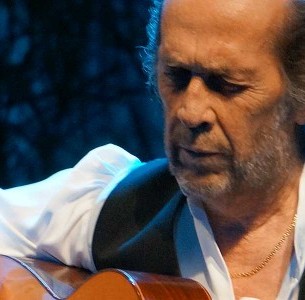Paco de Lucía spoke volumes with his music, and he did so without a single word. Through his guitar, his hands told exquisite stories in an intricate language which was forged by gypsies in Spain in contact with Moorish and Sephardic vocabulary as well.
Paco de Lucia was born in Algeciras, a city near the far southeastern point of Spain, the youngest of the five children of Antonio Sánchez and Lucia Gomes.
He adopted the artistic name of Paco de Lucía in honor of his Portuguese mother and began playing the guitar at seven years of age. By fourteen years of age, he was already touring with the flamenco troupe of famed dancer José Greco.
He met legendary flamenco singer Camarón de la Isla in 1968, and forged a collaboration with the singer that lasted until his death in 1992 and resulted in more than ten albums that were seminal to the New Flamenco movement.
De Lucía also brought jazz rhythms into his music and created beautiful and memorable pieces with musicians such as Latin jazz guitarist Al Di Meola.
Already in the late 1970’s, he introduced the cajón from Peru into Flamenco, today nearly indispensable in flamenco music. In interviews, he described how he discovered the cajón in Lima, Perú at a performance by Afro Peruvian percussionist Caíto.
De Lucia says he realized the cajón was the perfect percussion instrument for flamenco, as its sound had a deep affinity to the beats of flamenco footwork – both the sharp ratatatat of the heel as well as the deep slap of the sole of the shoe.
He continued to become known throughout his career for introducing instruments to flamenco that were less familiar to the art form, including using a harmonica player in his ensemble in recent years.
Even classical music bears witness to Paco de Lucia’s masterful touch, as his rendition of Joaquín Rodrigo’s Concierto de Aranjuez is one of the most beloved versions of the iconically Spanish composition.
Paco de Lucia touched many kinds of music with his Flamenco, yet he was no fusionist. The way he developed the art of flamenco without ever losing its integrity or true spirit is the hallmark of genius the likes of which may not grace the world of music again for some time to come.
Descansa en paz, Maestro.
Explore nuestra cultura and música with Catalina’s weekly show Beat Latino. On Facebook, and iTunes, and archived with playlist every week!
